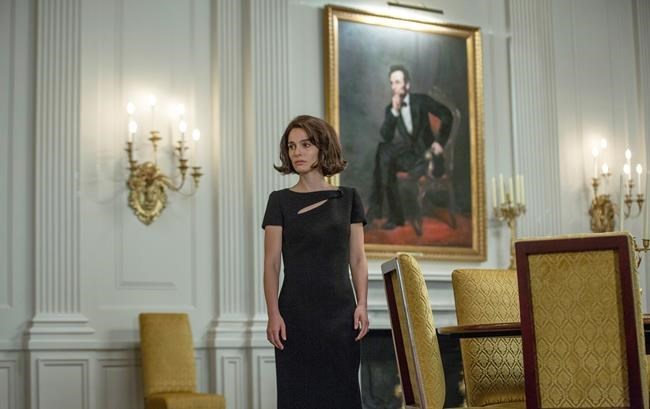
This image released by Fox Searchlight shows Natalie Portman as Jackie Kennedy in a scene from the film, "Jackie." (Stephanie Branchu/Fox Searchlight via AP)
November 29, 2016 - 4:45 PM
History, lately run amok, is ordered with such tidy, forceful finesse by Natalie Portman's Jacqueline Kennedy in in the piercing "Jackie." Summoning a journalist to Hyannis Port in 1963, not long after the assassination of John F. Kennedy, she coolly sets the record for her late husband's legacy, coining "Camelot" and shaping the mythology. Some details that don't fit the narrative she simply crosses out. "I don't smoke," she tells the Life magazine reporter (Billy Crudup), with a cigarette dangling between her fingers.
Pablo Larrain's "Jackie," a work of probing intimacy and shattered stereotype, is an electrifyingly fractured portrait of the former First Lady. Gone is the image of the wan, serene Jackie. Here, instead, is a savvy public-relations operator, a steely widow in grief and a woman redefining herself amid tragedy. "I'm his wi--" she begins saying after Dallas. "Whatever I am now."
The more complicated view of the mysterious Kennedy is inspired partly by the revelatory private interviews conducted by Arthur M. Schlesinger Jr. and released in 2011. She was not purely her pillbox-wearing public image, not merely a totem of grace, the candid tapes revealed.
Throughout "Jackie," we feel her discomfort at playing a starring role in an American fairy tale turned nightmare. The disharmony, sounded by Mica Levi's knotted, gloomy score, is always there between persona and person. "We're the beautiful people, right?" she sarcastically quips. Exiting Air Force One, she deadpans to her husband (Caspar Phillipson), "I love crowds." In Larrain's hands, Kennedy's pained public performance is a kind of sacrifice. "Jackie" is at once a deconstruction of the Jackie Kennedy fable and a dramatization of its making.
Penned by Noah Oppenheim ("The Maze Runner"), "Jackie" evades the traditional biopic format like a disease. It's organized around the Hyannis Port interview with flashbacks to events large and small before the assassination, during it and after. Many of the scenes, quiet and empty, are shot less like flashbacks than like Kennedy's own splintered, haunted memories.
Some, like her televised White House tour (recreated with black-and-white precision), are familiar. Others are strikingly surreal. Kennedy silently marching through a vacant White House, her pink suit bloodied from the shooting, is an unshakable image that feels straight out of Kubrick.
And then there's Kennedy stomping through rainy Arlington, her heels digging into the wet ground. Seeking a spot for what will be the Eternal Flame, she is, through force of will, staking a plot in history for her husband. "Have you read what they've been writing?" she first greets the reporter. "It's no way to be remembered."
Portman's Kennedy is, from the start, probably thornier and more uneasy than the woman ever was. Portman and Larrain have sharpened her and superimposed her story on a rigorously crafted but resolutely cold surface. "Jackie," though endlessly fascinating, can feel like a character study conducted on a surgical table.
Larrain, the talented Chilean filmmaker of the Oscar-nominated "No" whose equally complex "Neruda" is also out soon, is interested in dissecting Kennedy but not solving her. "I'll settle for a story that's believable," says Crudup's reporter. The truth, Kennedy says, is out of reach.
What is within the grasp of "Jackie" — aside from a compelling, intricate performance from a fully committed Portman — is a sense of how difficult it may have been for Kennedy to make things look so easy. With preternatural poise, she served as a bulwark of decorum and order against the chaos of the times. It's chilling now to hear the advice of Kennedy family friend William Walton (the great Richard E. Grant) after Lee Harvey Oswald is gunned down. He tells Kennedy to take the kids to Boston and "build a fortress." ''The world's gone mad, Mrs. Kennedy."
"Jackie," a Fox Searchlight release, is rated R by the Motion Picture Association of America for "brief strong violence and some language." Running time: 100 minutes. Three stars out of four.
___
Follow AP Film Writer Jake Coyle on Twitter at: http://twitter.com/jakecoyleAP
News from © The Associated Press, 2016